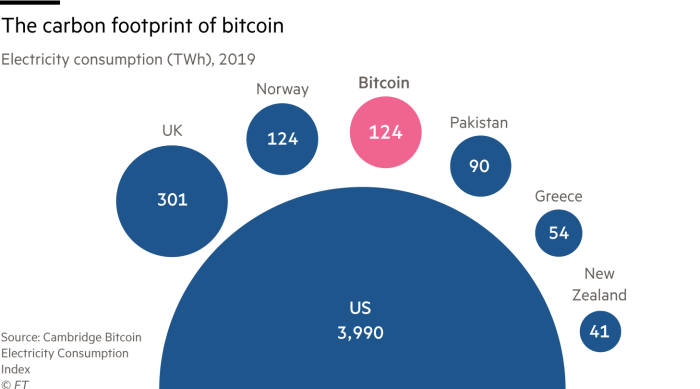Last month, Elon Musk offered $100m to fund a competition to find new ways of removing carbon dioxide from the air or water.
To win a slice of the cash on offer, competitors have “to create and demonstrate a solution that can pull carbon dioxide directly from the atmosphere or oceans and lock it away permanently in an environmentally benign way”.
The move helped burnish Musk’s green credentials, doubtless appealing to all those buyers of his Tesla electric cars who pride themselves on doing their bit for the environment. Yet before swallowing this green image, both they and Tesla’s shareholders might be wise to take a closer look at how the company is actually spending their cash.
Last week, Tesla disclosed it had invested $1.5bn of its reserves in bitcoin and unveiled plans to accept payments in the cryptocurrency for its electric cars, albeit “initially on a limited basis”.
Cue much cheering from bitcoin mavens and another lurch upward in its value to more than $48,000 — up two thirds so far this year. There was talk also of Tesla selling more cars by tapping into the pool of wealthy bitcoin speculators who like the company’s chief talking their currency up.
There’s just one hitch: it’s hard to square this new enthusiasm for crypto with environmentalism. For bitcoin isn’t environmentally neutral — it’s carbon-tastic idiocy. And the cheerleading of Musk actually makes it worse.
Critics deride bitcoin as useless, saying it lacks income and utility. Yet this punter’s plaything has serious environmental consequences. “Mining” bitcoin — the process by which the supply of coins is augmented — requires electricity on a vast scale to run the computers involved. According to the Dutch economist, Alex de Vries, it chomps through around 78 terawatt hours (TWh) a year globally — equivalent to the consumption of Chile, a country of 20m. Each bitcoin transaction uses the same amount of power as 436,000 through the Visa payment system.

Nor is this especially clean power. As de Vries points out, bitcoin miners are not interested in intermittent renewable energy. Needing to run their machines 24/7, many site their operations in places with cheap coal-fired electricity, such as Iran, Xinjiang province in China and Kazakhstan. In one case last autumn, a US bitcoin mining group even struck a deal to rescue a closing coal-fired station in Montana.
This fossil-fuel fixation leads to a humongous carbon footprint. According to a 2019 paper, the bitcoin network was estimated to have a carbon intensity of 480-500g of CO2 per kilowatt hour (KWh) of electricity. A comparable figure for the UK power network would be around 250g CO2/KWh.
Tesla’s intervention is likely to make those numbers worse. Higher bitcoin prices encourage more miners to hook up to the network. Cambridge University’s Judge Business School tracks bitcoin energy usage. In recent days, this has risen to levels equivalent to annual consumption of 121TWh — or roughly the size of the entire Dutch economy.
Of course, bitcoin isn’t the only digital service chewing through electricity like crazy. Silicon Valley is also an enormous user. The world’s data centres devoured some 200TWh in 2019, according to IEA data.
True, the US tech giants are now attempting to curb their associated emissions by increasing purchases of renewable energy. But as big tech snaps up more of the available green power, others will be pushed back on to the dirtier stuff.
Musk’s espousal of bitcoin exhibits very questionable judgment. It is hard to see how shares in Tesla can remain in any green portfolio while the company is investing in bitcoin. Yet at present, it has an “A” ESG rating from the index compiler MSCI.
More broadly, the rise of crypto illustrates the difficulty of hitting net zero when tech companies have such incentives to develop new power-hungry applications (think Zoom or Netflix, for instance). Silicon Valley hopes to resolve this contradiction with untested technical fixes such direct air capture. (Musk has even mooted sending people to Mars as some sort of terrestrial insurance policy.) The real solution though may be rather more earthbound. It may lie in governments taxing externalities to restrain galloping demand.
jonathan.ford@ft.com
https://ift.tt/3b2qwDv
Business
Bagikan Berita Ini














0 Response to "The environmental idiocy of Tesla’s bitcoin bet - Financial Times"
Post a Comment